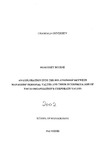JavaScript is disabled for your browser. Some features of this site may not work without it.
| dc.contributor.advisor | Jenkins, Mark | |
| dc.contributor.author | Bourne, Humphrey | |
| dc.date.accessioned | 2009-08-17T15:03:08Z | |
| dc.date.available | 2009-08-17T15:03:08Z | |
| dc.date.issued | 2002-06 | |
| dc.identifier.uri | http://hdl.handle.net/1826/3595 | |
| dc.description.abstract | The predominant assumption in the management literature is that corporate values are internalised into organisational members' personal value systems. Corporate values, viewed in this way, perform a controlling role in organisations, consistent with the characteristics of a deliberate strategy perspective. Theories concerning the nature of personal values challenge this assumption of corporate value internalisation. However, there is a lack of empirical research in the management field investigating the relationship between personal and corporate value systems. In this interpretive research study, I explore managers' interpretation of their organisation's corporate values, and relate these to their personal value priorities. Senior managers from three commercial companies took part in the study: one with no published corporate values statement; one with a recently introduced statement; and the third with a well established corporate values statement. I explore how managers interpret their organisation's corporate values through the description and meaning they give to value terms, and elicit their personal values by using an adaptation of the laddering technique, and by inferring values revealed in managers' narrative of their career histories. The findings show that managers feel they share their corporate values but interpret them in differing ways, both through those they identify as representing the corporate values, and through the meaning they give to value terms. The variation in interpretation is consistent with differences in their own personal value priorities, suggesting that managers adapt corporate values so that they more closely reflect their own. These findings challenge the notion that corporate values provide an effective means of normative control, and instead suggest they legitimise the worldview of individual managers, thus enabling differences to be accommodated within a broad framework of shared values. A model of value relationships is proposed, suggesting a way that corporate values may assist in bringing together deliberate and emergent strategy perspectives. | en_UK |
| dc.language.iso | en | en_UK |
| dc.publisher | Cranfield University | en_UK |
| dc.rights | © Cranfield University (2002). All rights reserved. No part of this publication may be reproduced without the written permission of the copyright holder. | en_UK |
| dc.title | An exploration into the relationship between managers' personal values and their interpretation of their organisation's corporate values | en_UK |
| dc.type | Thesis or dissertation | en_UK |
| dc.type.qualificationlevel | Doctoral | en_UK |
| dc.type.qualificationname | PhD | en_UK |
